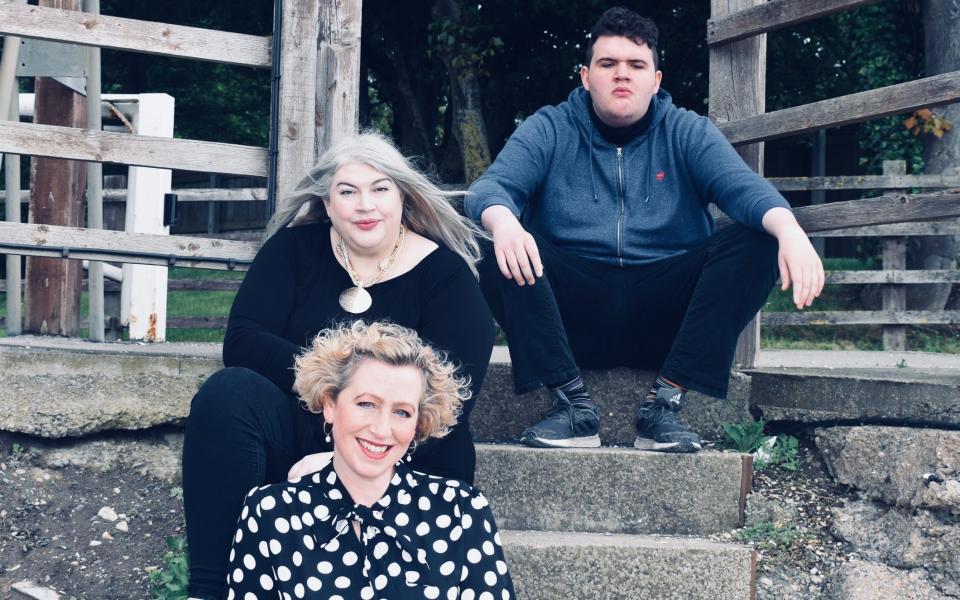‘My friend’s 20-year-old autistic son asked to kiss me – and inspired my next novel’

Walking through Marks and Spencer with my 20-year-old friend Sean a few years ago, he said: “Do you know, Louise, I’ve yet to have my first kiss.”
His mum Fiona – one of my best friends – was bustling about somewhere else. “Do you think you’d like to be my first?” Sean asked me, seriously.
“That might be tricky,” I admitted. “Why?” he asked. “Don’t you like me?” “Yes, very much,” I said. “But here’s the thing: I’m good friends with your mum. I’m also married. And I’m 20-odd years older than you. You should find a lovely girl your own age.”
“I can’t,” he said, with zero self-pity. “They’re not interested in me.” And he disappeared down the bakery aisle.
A month after this conversation Fiona – a presenter at BBC Radio Humberside – and I met for lunch. She looked exhausted and admitted she was having a difficult time with Sean. He was still desperate to meet a girl, find love and, most importantly, have sex; all the things most young men desire. But it was proving tricky. His quirky ways and frank language could be off-putting to women. This made him feel rejected, lonely, different. He had been to the Special Needs Dance at the local university a few times but “wasn’t impressed”.
As we ate, Fiona confided in me, with emotion. “Sex is all Sean talks about,” she said. “It’s obsessive. I’ve sought advice on how to talk to him about safe sex and consent, but there’s nothing geared towards anyone like him. Various specialists shrugged and said it wasn’t something they’d ever dealt with. A member of one organisation said that I was his mother, I should sort it out. I felt alone.”
She admitted that the previous night she and her husband Pete had sat in tears, and – partly joking, partly in desperation – said: “Do we just take Sean to Amsterdam and pay someone to make him happy?”
“We dismissed the idea as soon as we thought of it,” she said. “Do you think I’m a bad mum?”
“God, no,” was my immediate, heartfelt response. Fiona is the kind of mum I’d have loved – warm, funny, patient. “You love Sean,” I said. “You just want him to be happy.”
You see, Sean is autistic. “He has a different view of the world,” Fiona often says. “He calls it autistic spectrum perception.”
He and his twin brother Connor, also on the spectrum, were officially diagnosed aged three after a worker at their nursery noted that they behaved “differently”. While other children were quietly playing, Sean ran around in circles, flapping his arms like a little bird. Fiona already knew. Mothers often do.
Sean, now 23, is happy to tell you his thoughts on the world, on autism, on others’ views of ASD. “Most people can be very patronising,” he says. “I don’t want sympathy, I want acceptance, and many people belittle me.”
Fiona never actually took the route of paying a professional to give Sean what he desperately needed, laughing now at what might have ensued. Sean wouldn’t have minded at all though.

Fiona’s idea had fired my imagination. I wondered, what if a desperate mother had hired a sex worker for her autistic son?
The next time I met them for lunch, Sean loudly voicing annoyance that there wasn’t any vegetarian chilli con carne, I put my idea to them: that I wanted to write a fictional book inspired by Sean’s real-life experiences. That it was a story pleading to be told, full of issues begging to be addressed, rich in themes of a universal appeal. The Court of Protection has recently ruled it lawful for carers to help an autistic client visit a sex worker. Mr Justice Anthony Hayden said that carers shouldn’t be prosecuted for helping certain people with “this most important sphere of human interaction”.
Fiona said she would love me to write a book. “You know us both so well and you’ll do it sensitively. It’s a taboo. No one talks about people with special needs having sex. This story could be important because it’ll address many misconceptions, deal with the prejudice young autistic men face. It’s a story for the world. If you don’t tell it, who will?”
Sean also said he was very keen to get involved when I wrote This Is How We Are Human. I asked if he minded me writing this book rather than him. I didn’t want to take away from the #OwnVoices movement, which highlights authors from marginalised and under-represented groups writing about their own experiences from their own perspective. Who was I to presume to know how it felt to live that life, to experience that world? “You should write it,” said Sean. “You’re a writer, while I might be a politician one day.”
Two years on, Sean is now at college doing an “into work” scheme and work experience on a building site. He still has plenty of opinions that he’s happy to share.
Has Sean found love? “I haven’t met anyone yet or had sex,” he admits. “But I did have a first kiss with a bossy girl. It was very nice, but I don’t think we were suited. It’s still hard to meet anyone and most of the people I have met have been a--------.”
Whatever happens in the future, Sean will never ever be anything but honest, and that’s why I adore him.
This is How We Are Human by Louise Beech (RRP £8.99). Buy now for £7.99 at books.telegraph.co.uk or call 0844 871 1514


